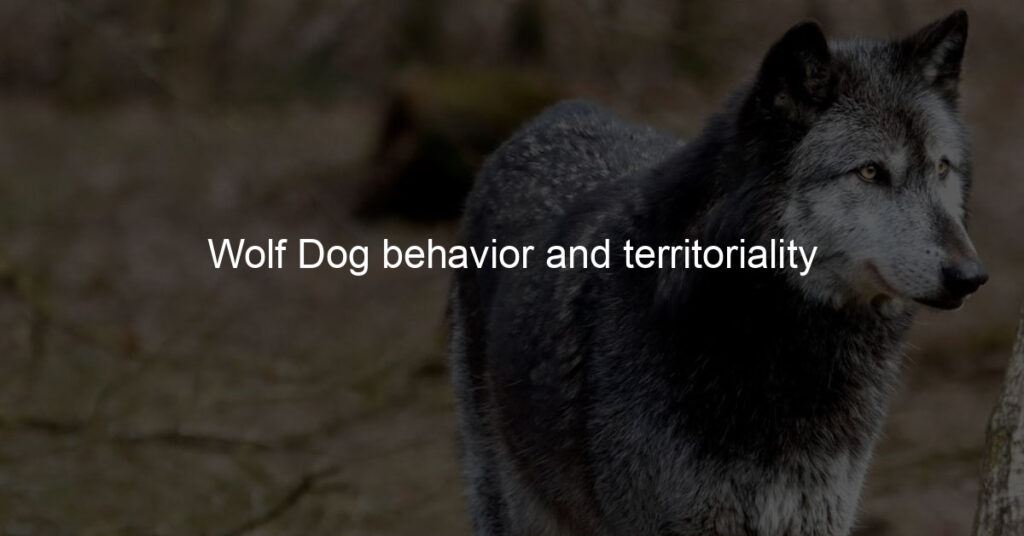As a wolf dog owner, you know that managing their behavior can be quite challenging – they have ancient instincts and wild natures, making different issues arise in comparison to traditional breeds. One of the most important points to consider as a wolf-dog owner is territoriality.
It’s not uncommon for these animals to display aggressive behavior when feeling territorial, so it’s critical to develop an understanding of exactly why and how this issue manifests. In this blog post, we’ll look at what territoriality looks like for your wolf dog, provide strategies for managing those behaviors appropriately, and explain the importance of establishing boundaries from day one.
Are wolf dogs territorial?
Wolf dogs can seem intimidating at first glance, with their combination of wild looks and husky coats. However, the truth about wolf dogs is that they are very friendly and outgoing animals, albeit a bit more territorial than your average pup. This is because they are a mix between wolves and domesticated dogs, inheriting some instincts from their wild relatives.
While they do have the desire to protect their own space and people, these feelings can be managed through plenty of socialization training. Once this is accomplished, you can rest assured knowing that your furry companion won’t object to houseguests or become overly aggressive in strange environments—just make sure you take the time to build up its trust!
How much land does a wolfdog need?
Wolfdogs are beautiful, powerful animals that require a lot of care and attention. As members of the canine family, they’re very active and need plenty of space to move around and explore. So when it comes to how much land they need, it depends on the individual dog’s behavior.
A wolfdog’s size and energy level will determine how much space they require; a larger, more energetic wolfdog may need between 3 and 5 acres of land to stay healthy and happy. If you’ve got a smaller variety or an older, easier-going pup then 2 acres may be enough for them. Whatever their size, wolves are naturally curious creatures so anything less than an acre or so is likely to leave them feeling pent up and frustrated over time – something none of us would want!
Are wolf dogs aggressive?
Wolf dogs can be aggressive, but it is important to point out that their aggression level in them can vary greatly. The amount of wolf-like behavior and temperament in any given wolf dog is determined by its genetic makeup which creates a wide range of personalities and behaviors.
That being said, if you are considering adding a wolf hybrid to your family, it is vital to do research on the breeders you are looking at and ask detailed questions about their wolfdog’s background and temperament before committing to bringing one home.
Even with wolves that have been professionally bred for generations, it’s important to remember that no two animals with innate wildness will ever be identical – each k-9 could react differently when met with potentially threatening events so taking proper precautions should always be considered, and is highly advised.
Are wolf dogs protective of their owners?
Wolf dogs may be descendants of wild wolves, but they are far from savage. They can make loving and loyal family pets if they are properly trained and have received enough socialization.
Wolf dogs can be more protective of their owners than some domesticated breeds. While larger than other animals, these canine hybrids have an innate sense of protectiveness that makes them great companions.
Though it is always important to consider the animal’s temperament when assessing its behavior, wolf dogs tend to be intuitive toward their human owners and highly aware of unknown threats and potential dangers in the outdoor environment. Ultimately, with the right upbringing and care, your beloved wolf-dog can be a trusted guardian for years to come.
Final thoughts: Wolf Dog behavior and territoriality
Wolves and wolf-dogs possess an innate territorial instinct that typically involves barking, growling, and howling. Wolves will typically try to avoid people out of fear and a strong sense of self-preservation; unless confronted with aggression, they will almost always prefer to flee rather than fight.
Like wolves, wolf-dogs may also exhibit territorial behaviors like stalking, growling, and alerting family members when strangers are around the yard. Owners of wolf dogs need to understand the unique behavior patterns possessed by these animals so appropriate measures can be taken both for their safety and the safety of those living nearby.
When lovingly cared for regarding all aspects of its needs—such as fresh air, plenty of food and water, regular exercise, mental stimulation through training sessions, exposure to other animals/people at times (always under supervision), sufficient rest periods—your wolf-dog can develop into a happy social companion that is easy on the leash and reliable within your home!








